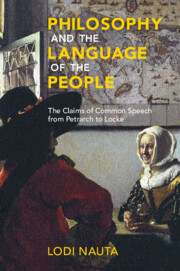
- Cited by 2
-
Cited byCrossref Citations
This Book has been cited by the following publications. This list is generated based on data provided by Crossref.
Lærke, Mogens 2024. Kenelm Digby's logic of common and natural notions. The Southern Journal of Philosophy,
dos Santos, Allan Gabriel Cardoso 2024. The scholastic’s dilemma: Hobbes critique of scholastic politics and papal power on the Leviathan frontispiece. History of European Ideas, Vol. 50, Issue. 1, p. 1.
- Publisher:
- Cambridge University Press
- Online publication date:
- July 2021
- Print publication year:
- 2021
- Online ISBN:
- 9781108991476
- Subjects:
- Renaissance Philosophy, Early Modern Philosophy, Philosophy


